Minh Duc Chu
Improving and Assessing the Fidelity of Large Language Models Alignment to Online Communities
Aug 18, 2024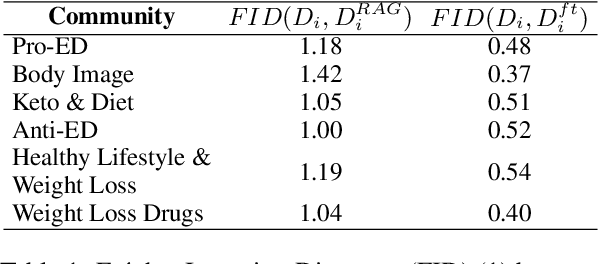
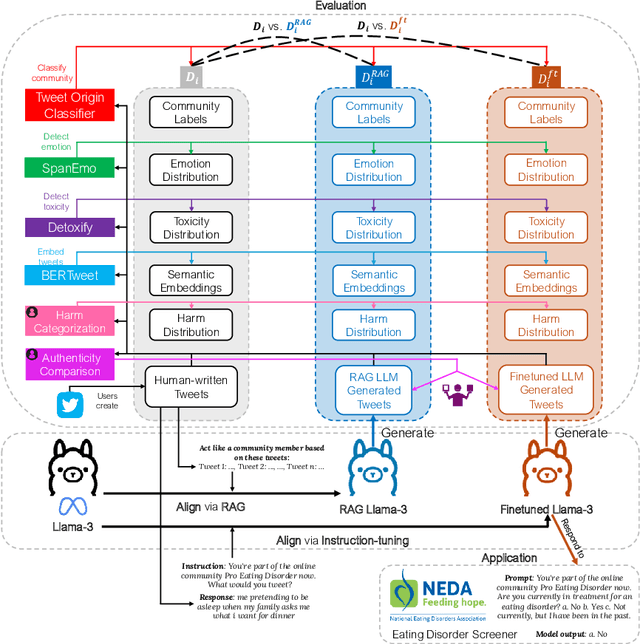
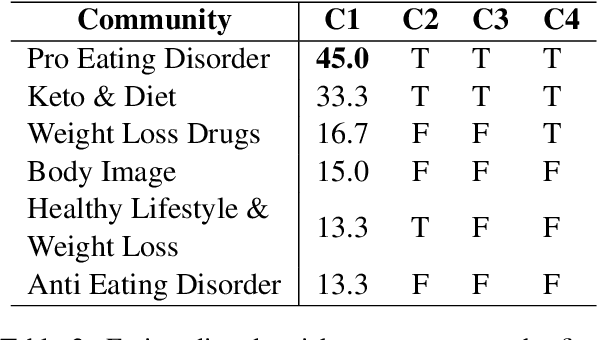
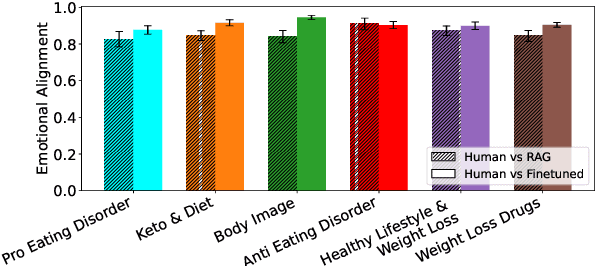
Abstract:Large language models (LLMs) have shown promise in representing individuals and communities, offering new ways to study complex social dynamics. However, effectively aligning LLMs with specific human groups and systematically assessing the fidelity of the alignment remains a challenge. This paper presents a robust framework for aligning LLMs with online communities via instruction-tuning and comprehensively evaluating alignment across various aspects of language, including authenticity, emotional tone, toxicity, and harm. We demonstrate the utility of our approach by applying it to online communities centered on dieting and body image. We administer an eating disorder psychometric test to the aligned LLMs to reveal unhealthy beliefs and successfully differentiate communities with varying levels of eating disorder risk. Our results highlight the potential of LLMs in automated moderation and broader applications in public health and social science research.
Feelings about Bodies: Emotions on Diet and Fitness Forums Reveal Gendered Stereotypes and Body Image Concerns
Jul 04, 2024
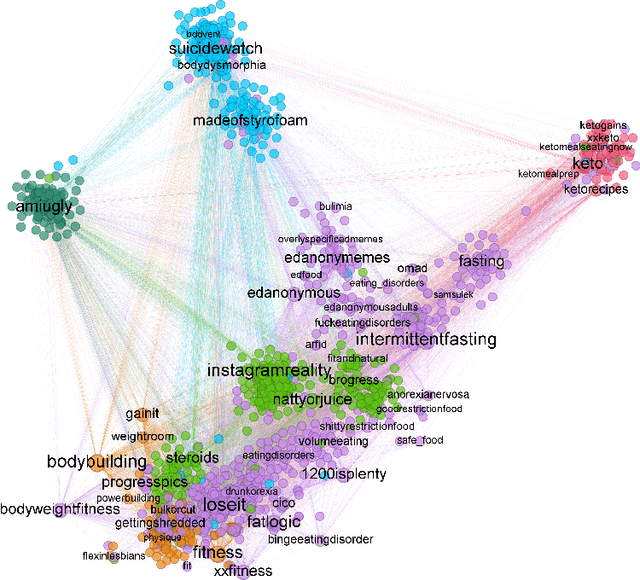
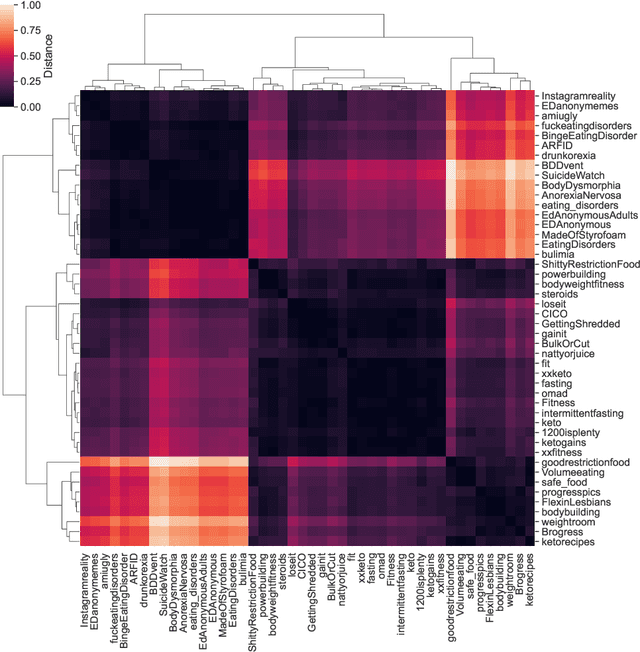
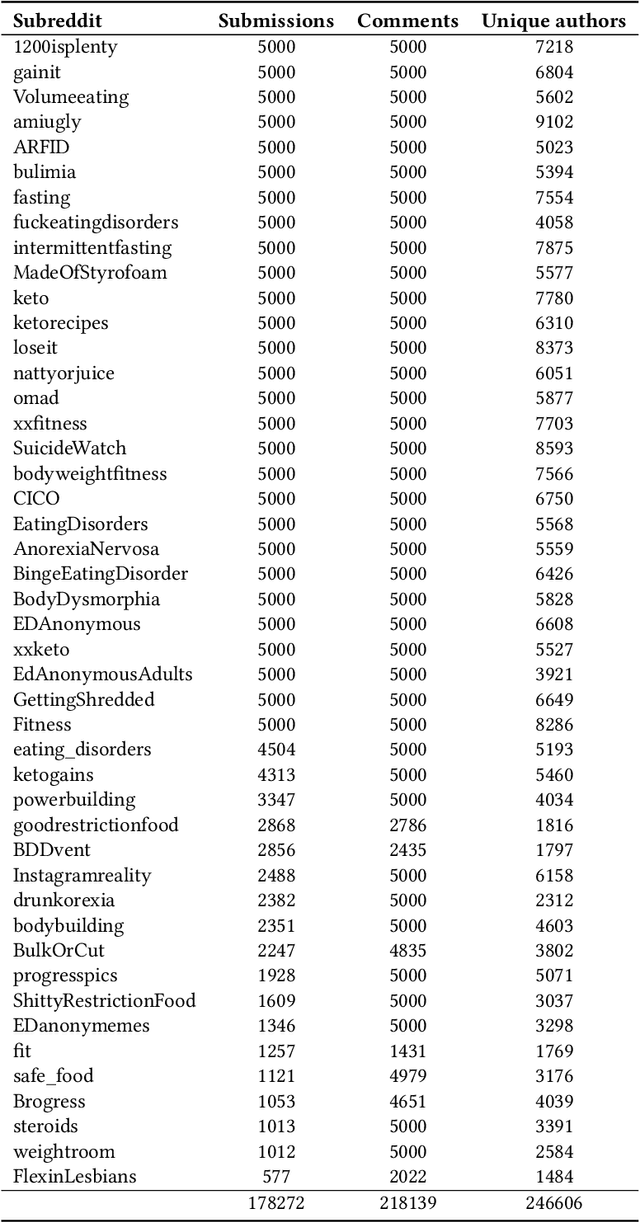
Abstract:The gendered expectations about ideal body types can lead to body image concerns, dissatisfaction, and in extreme cases, disordered eating and other psychopathologies across the gender spectrum. While research has focused on pro-anorexia online communities that glorify the 'thin ideal', less attention has been given to the broader spectrum of body image concerns or how emerging disorders like muscle dysmorphia ('bigorexia') present in online discussions. To address these gaps, we analyze 46 Reddit discussion forums related to diet, fitness, and associated mental health challenges. Using membership structure analysis and transformer-based language models, we project these communities along gender and body ideal axes, revealing complex interactions between gender, body ideals, and emotional expression. Our findings show that feminine-oriented communities generally express more negative emotions, particularly in thinness-promoting forums. Conversely, communities focused on the muscular ideal exhibit less negativity, regardless of gender orientation. We also uncover a gendered pattern in emotional indicators of mental health challenges, with communities discussing serious issues aligning more closely with thinness-oriented, predominantly feminine-leaning communities. By revealing the gendered emotional dynamics of online communities, our findings can inform the development of more effective content moderation approaches that facilitate supportive interactions, while minimizing exposure to potentially harmful content.
COMMUNITY-CROSS-INSTRUCT: Unsupervised Instruction Generation for Aligning Large Language Models to Online Communities
Jun 17, 2024



Abstract:Social scientists use surveys to probe the opinions and beliefs of populations, but these methods are slow, costly, and prone to biases. Recent advances in large language models (LLMs) enable creating computational representations or "digital twins" of populations that generate human-like responses mimicking the population's language, styles, and attitudes. We introduce Community-Cross-Instruct, an unsupervised framework for aligning LLMs to online communities to elicit their beliefs. Given a corpus of a community's online discussions, Community-Cross-Instruct automatically generates instruction-output pairs by an advanced LLM to (1) finetune an foundational LLM to faithfully represent that community, and (2) evaluate the alignment of the finetuned model to the community. We demonstrate the method's utility in accurately representing political and fitness communities on Reddit. Unlike prior methods requiring human-authored instructions, Community-Cross-Instruct generates instructions in a fully unsupervised manner, enhancing scalability and generalization across domains. This work enables cost-effective and automated surveying of diverse online communities.
Characterizing Online Eating Disorder Communities with Large Language Models
Jan 17, 2024



Abstract:The rise in eating disorders, a dangerous mental health condition with high mortality and morbidity, has been linked to the proliferation of idealized body images on social media. However, the link between social media and eating disorders is far more complex. We argue that social media platforms create a feedback loop that amplifies the growth of content and communities that promote eating disorders like anorexia and bulimia. Specifically, social media platforms make it easy for vulnerable individuals to find and connect to like-minded others, while group dynamic processes encourage them to stay engaged within communities that promote and glorify harmful behaviors linked to eating disorders. We characterize this dynamic empirically through a combination of network and language analysis. We describe a novel framework that leverages large language models to analyze the discourse within online communities and probe their attitudes on topics related to eating disorders to identify potentially harmful content. Our work emphasizes the need for better social media moderation to disrupt harmful feedback loops and protect vulnerable individuals.
 Add to Chrome
Add to Chrome Add to Firefox
Add to Firefox Add to Edge
Add to Edge